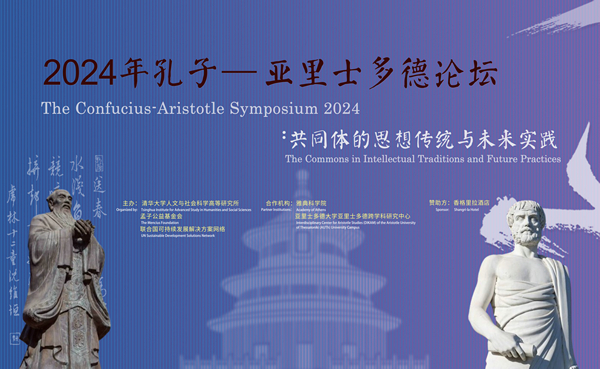Tsinghua University: 2024 Confucius-Aristotle Symposium Takes Place in Beijing
The Confucius-Aristotle Symposium 2024, co-organized by the Tsinghua Institute for Advanced Study in Humanities and Social Sciences, the Mencius Foundation, and the UN Sustainable Development Solutions Network (UN SDSN), was held in Beijing on July 11-12.
Themed “The Commons in Intellectual Traditions and Future Practice,” the two-day event was attended by 101 scholars from 17 countries, including China, the United States, the United Kingdom, and Greece, with 66 international participants.
The forum aims to expand thinking on the concept of “community” and explore solutions to various contemporary global challenges, such as unequal development, changes in the international order, ecological and climate crises, and technological iterations through discussing how to draw upon the wisdom of ancient civilizations in the East and West.
Qiu Yong, secretary of the CPC Tsinghua University Committee, Jeffrey Sachs, president of UN SDSN, and Meng Liang, chair of the Mencius Foundation, delivered keynote speeches at the opening ceremony.
In his opening speech, Qiu remarked that the current changes in the world and this era are unfolding in unprecedented ways. To address the common challenges facing humanity, it is essential to harness the power of cultural dialogue to eliminate discrimination and prejudice, enhance understanding and trust, promote people-to-people connectivity, and strengthen unity and cooperation.
“The profound and enlightening thoughts of Confucius and Aristotle, as outstanding representatives of ancient Eastern and Western civilizations, transcend the course of history,” Qiu said.
Hailing the event as a cross-temporal dialogue of civilizations and an academic feast of cultural exchanges, Qiu said his university is willing to play an active role in promoting educational exchanges and contributing to the creation of a better future for humanity.
Sachs argued that ancient Eastern and Western philosophical thoughts, especially the concept of “harmony in diversity” embodied in Confucianism, hold significant relevance in addressing present-day challenges. He also called for collaborative efforts to develop a shared understanding of what content in the ancient Eastern and Western philosophies should be taught to students in the 21st century.
Meng saw a strong similarity between Mencius’ teachings and Aristotle’s theories of “justice” and “virtue”, both still holding great relevance to contemporary governments and political leaders.
Keynote speakers including Jomo Kwame Sundaram, a Malaysian economist; Zhang Zhiqiang, director of the Institute of Philosophy, Chinese Academy of Social Sciences; and Chen Xiaoxia, a professor with Nishan World Center for Confucian Studies; shared their insights into the rich connotations of “community,” the transcendent nature of Chinese civilization, and the contemporary value of the concept of “community.”
The symposium included five panels: Civilization in History: Principle, Transfiguration, and Rebirth; The Public in Pre-Modern Polity: Governance, Wealth, and Ethnic Groups; Indra’s Net: Ecology as a Methodology; Sustaining the Mind: From Embodied Skills to AI Platforms; Historical and Philosophical Perspectives on the Commons and Contemporary Practices of Commoning.
During the panel discussions, conference participants delved into the theory and practice of “community” from various dimensions such as classical studies, political philosophy, ecology and religion, artificial intelligence, and public policy-making.
The event also featured a holographic dialogue between Mencius and Aristotle presided over by Sachs and Meng.
Jointly initiated by UNSDSN and the Athens Academy, the Confucius–Aristotle Symposium was first held in Athens in 2019 and has since been organized three times.

